Cycling, spirituality and the meaning of life
At face value, A Peiper's Tale presents as an honest account of life inside the professional...
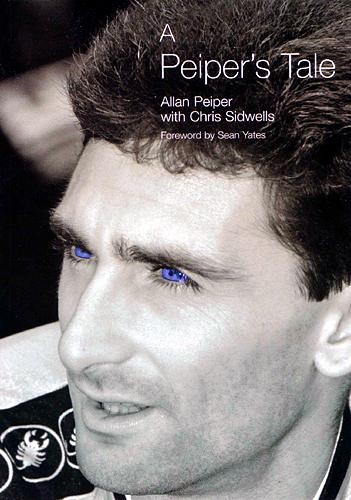
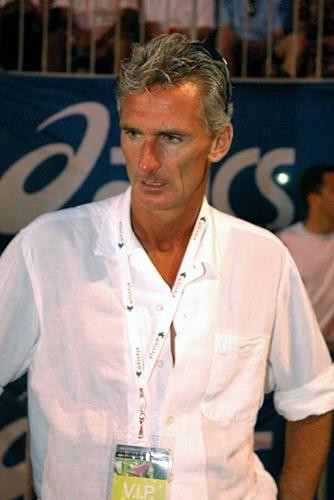
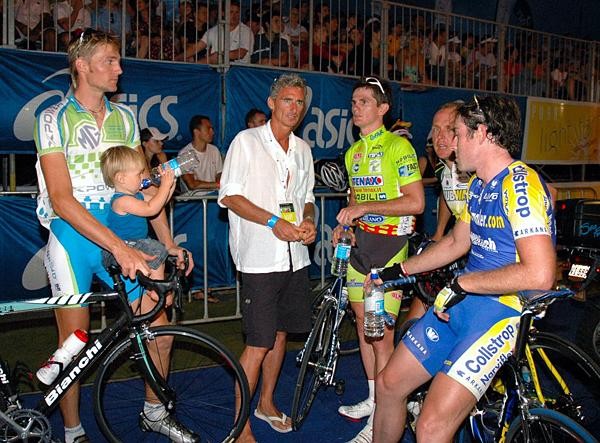
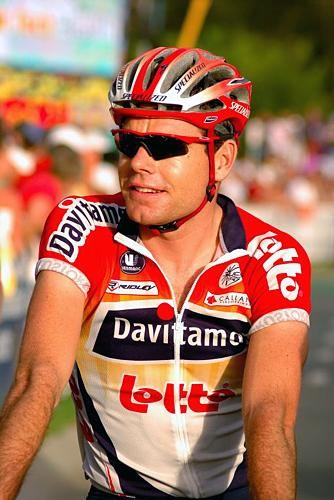
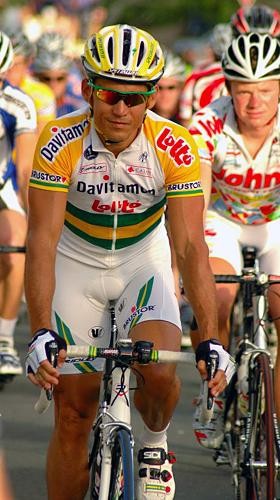
An interview with Allan Peiper, November 14, 2005
Meeting the man behind A Peiper's Tale
At face value, A Peiper's Tale presents as an honest account of life inside the professional peloton. Taken from the perspective of a man who came from unconventional beginnings to ride as a domestique with the top-shelf pro teams including Peugeot and Panasonic in the 1980s, Allan Peiper speaks with candidness about the big issues in the sport: from doping to dodgy deals, team politics and, more recently, his role as a directeur-sportif with Davitamon-Lotto.
But it's fair to say this book is not 'just' about the bike. Peiper shows himself to be a person of depth and introspection, whose life journey from the back-blocks of rural Australia to Belgium and then the big-time reveals much about 'the human condition' and our personal spirituality. Cyclingnews' correspondent John-Michael Flynn enjoyed a coffee with him at the recent Noosa International Criterium, where he talked about cycling, life and the need to bare his soul to the world in print.
Dressed in a white linen shirt, the tanned and leathery skin of this 45 year-old former pro-cyclist could easily blend in with the alfresco atmosphere in Australia's sub-tropical holiday mecca of Noosa.
As I sit across the table sipping a cappuccino and listening intently, it's Peiper's piercing blue eyes (captured intelligently on the cover of his book), which give him away. For here is a man who could never make a living as a poker player, and his book tells us as much, by way of his frank and honest accounts of life as a pro cyclist.
But those eyes tell us yet more, for Peiper carries with him the scars of a troubled past, troubles which shaped his career and form the basis of what is an inspiring life story, put into print. He is, it must be said, a child of his generation. The ten years post-cycling have been spent on a journey of spirituality, where Peiper explored meditation, yoga, visited India twice, and sought solace in the dreaming country of Australia's Western Desert, in the search for meaning.
The latest race content, interviews, features, reviews and expert buying guides, direct to your inbox!
"I've done a lot of self reflection in the last years and going back to my youth I saw what made me so angry and saw what made me want to succeed to prove that I was worthy," Peiper recalls.
"The scary part is when you get to the end of your career; how do you put it in order and how do you live with the ghosts of the past? When you come to stop bike riding, that's when the rooster comes home."
To summarise the opening chapters of his book, Peiper was raised in country Victoria and grew up in a dysfunctional family, with an alcoholic and at times violent father. At sixteen, Allan's parents separated, but when his mother decided to go back his wife-beating father, young Peiper had enough and left home for good. Within a year, after working a factory job and saving every dollar, the Australian junior champion would find himself in Belgium, chasing the dream of becoming a professional road cyclist.
"You know, I was just spurred on by the fact that I couldn't go back," Peiper recalls of his bold decision to travel halfway across the world to live in Belgium. "I lived in rat-infested houses with twenty other people, where there was no front door and I had one blanket and very little food, but there was a brotherhood there between us because we were all the same."
The book goes on to chart a course through Peiper's four years racing as a junior in Belgium before he turned pro at the age of 21. Central to the story is his relationship with the family of Belgian champion Eddy Planckaert, who took the young Australian in and helped shape his career.
He learnt early on how to wheel and deal in order to survive, even stealing produce from the fields, but when I suggest that it all sounds like a romantic existence for a young Australian cyclist in Europe, there are some reservations. "Looking back you might say romantic but it was a life struggle in those days you know and I sold races to win races.
"I made deals with two or three riders in the same race that they'd pay me if they won, but I still sprinted for first prize; if I won I took the money for first prize and if they beat me I took the money they paid me and my second prize."
Life as a pro domestique
Following on from a stellar junior career, Allan Peiper's pro career began in 1983 when he joined the French Peugeot team. He spent three years with Peugeot then signed with Panasonic, where the Australian rode for five years from 1986 to 1990, before finishing his career with a two year stint at the Belgian team Tulip Computers.
Peiper's palmarès could put many a struggling pro cyclist to shame, but he insists winning races was not the highlight of his career. "I define myself not so much as a winner, even though I won 35 races as a pro you know, time trials and prologues against the best riders," he recalls. "I won some nice races, I won a stage at the Tour of Italy and I won the team time trial in Tour de France, but for me, being a team player was the most important part of my career."
Not surprisingly, the former Peugeot and Panasonic domestique gets emotional when recalling some of the great cyclists he rode for and it is the sprinters, in particular Belgian great Eric Vanderaerden, who comes in for special mention in his biography.
"Eric was a hard man, he was the man I rode for, he was the pivotal figure in my career," Peiper says. "He was the closest thing that I could define to Robbie McEwen."
On the burning question of who is Australia's greatest ever road cyclist, it is Phil Anderson, not McEwen, who Allan rates at the top of his list. Not just for his stellar feats on the bike, but the role Anderson played in changing the entire look of professional peloton at a time when English speaking riders were very much outsiders.
"There were a lot before me, but only very few that ever succeeded," Peiper said of the Australians on the roads of Europe. "Phil Anderson was the first one to wear the yellow jersey and wore it for ten days and put (Australian) cycling on the map."
Doping in cycling
The topic of doping is a recurring theme in the book and it is perhaps on this subject where A Peiper's Tale differs from the routine of most benign professional sporting biographies, which tend to neatly tip-toe around the topic.
"I tried to ride clean, most of the time," Peiper reveals in the book's introduction.
It is an admission which is unlikely to earn praise from the media in his home country when this book is released there. Australians have long proclaimed a holier than thou attitude to drugs in sport, but for a rider who was one of the ground-breakers for Australian cycling in Europe, there is no intention of justifying the use of illegal performance-enhancing substances.
Peiper simply says he wants the broader community to understand what drives a cyclist to succeed, and the world he is confronted within in a team environment where riders place their trust in doctors and team management who don't always have the cyclists' best interests at heart.
"What got my back up was sensationalism from the newspapers portraying the bike rider as being the worst man and it's not always black and white," the Davitamon Lotto directeur-sportif says. "It's always the sportsman himself who ends up being the dupe, whether he had anything to do with or not, whether someone gives it to him unbeknown."
Peiper points to the recent non-negative test result of Danilo Hondo as an example where the zero tolerance approach to doping can, in his opinion, claim unfortunate victims. "Danilo Hondo was sentenced to two years this year for some stupid product that's been off the market for two years in a ridiculous race that had no value to him.
"But how does he stand up and say, look I didn't do this?" he asks. "If you walk down death row, your career's over."
Contrasting, or perhaps even contradicting his feelings about the existing 'black and white' approach to doping penalties, Peiper also speaks with optimism about the existing testing regime, which he believes is making the environment safer for young riders. "Things are getting better things are definitely different," he says.
Cadel, Robbie and the Lotto boys
Allan Peiper admits after his time in the wilderness, he is now positioned in one of the best jobs in cycling as a directeur-sportif with Davitamon-Lotto. The Victorian is one of five Australians at the Belgian team and he speaks glowingly of his work with riders Nick Gates, Henk Vogels, Robbie McEwen and Cadel Evans, with Nick Sanderson joining the team in 2006.
While McEwen's feats speak for themselves, it is Evans who arguably holds the most promise as the team prepares its abundantly talented G.C. rider for his second Tour de France [Evans finished 8th this year in his first Tour - ed.]
"There's some skills of Cadel's that still need to be honed, his descending skills still need to be honed," Peiper concedes. "Lance showed us how to do it, we're just following all the steps he took."
Preparing Evans for the Tour de France will be a key focus for Lotto's team management in 2006. But therein lies a challenge, providing for the needs of an up and coming G.C. rider, who just happens to be on the same team as one of the world's top three sprinters.
"Mark [Sargeant] is aiming for top five next year with Cadel," Peiper revealed. "There needs to be a lot more groundwork done. I don't know that we do have the right ingredients to support Cadel in the right manner, because whatever happens with a sprinter like Robbie McEwen and a classification rider like Cadel, there needs to be a compromise."
As for McEwen, Peiper resorts to 'football coach speak' when he says he's not about to play up to the egos of the big name sprinters who are handsomely paid to win races. But then comes that streak of honesty which permeates throughout the book when he drops the poker face and admits "Robbie's a blessing. Any team would love to have Robbie. There's a drive in Robbie that not many bike riders have."
Reviewer's comment:
If you love a good sporting biography as I do, A Peiper's Tale is the sort of read which will make you cry, make you laugh, then make you want to blow the doors off your best mate on the next training ride. I suspect Peiper hasn't told us everything about his career, but some confidences are best honoured and we are all entitled to a degree of privacy.
Allan has been generous enough with this book to give us a glimpse inside of a world most of us only get to observe from the periphery, and his contribution to the debate on the big issues like doping should be valued. A fine read.
To order this book
A Peiper's Tale is written by Allan Peiper with Chris Sidwells and is currently published in the U.K. by Mousehold Press in Association with Sport & Publicity. Cyclingnews and Amazon have joined to bring this book to the rest of the world. Priced at just £12.95 plus postage, simply click here to own this intriguing read.
